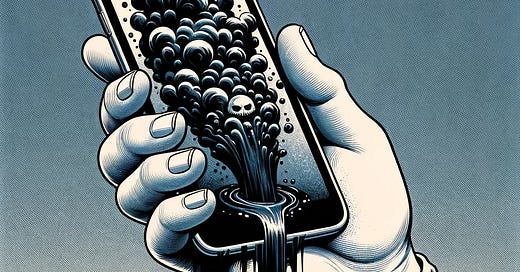A pocket full of poison
Navigating the digital age: from the dawn of social media to a detox for mental health.
One thought
As a Millennial, I've seen the transition from dial-up internet to broadband, flip phones to smartphones, and bulletin boards to algorithmic feeds. In college, I received an exclusive invitation to join Facebook, which would then go on to develop a business model where users are the product, capitalizing on the fact that controversy and conflict significantly increase engagement.
In 2008, I noticed a decline in my mental health when I used these platforms, and I started disconnecting. First Myspace (yes, I’m dating myself), followed by Facebook a few years later. Last year, I left Twitter following its acquisition by Musk due to its undeniably toxic environment, despite its meaningful role in kick-starting my career.
Jonathan Haidt, a social psychologist and author, delves into the impact of social media and the internet on mental health and social dynamics of young people in his recent book "The Anxious Generation." Haidt highlights that teenage mental illness rates have surged since 2010, coinciding with the release of the iPhone 4's "selfie" camera, Facebook's "Like" button, and Instagram's launch. He shares alarming statistics from the following decade:
Depression and anxiety diagnoses among US college students more than doubled
Emergency room visits for self-harm rose by 188% for teenage girls and 48% for boys
The suicide rate increased by 167% for girls and 91% for boys
Haidt makes a crucial distinction between "the Internet" and "social media," a difference I appreciate. He suggests that the Internet has been "pretty great," democratizing information access and enabling unparalleled learning and collaboration. However, he links the rise in social media use, where engagement surpasses well-being, with rising mental health issues in adolescents.
I recently came across a quote from Edward O. Wilson, Harvard professor and father of sociobiology, who said, "the real problem of humanity is the following: We have Paleolithic emotions, medieval institutions, and godlike technology." These hyper-viral social networks are not the digital equivalent of a book club or happy hour. They have been optimized to trigger very primal parts of our brains, and they work really well.
Haidt recommends several "new norms" to encourage a healthier childhood in the digital age:
No smartphones before high school
No social media before 16
Phone-free schools
TikTok is currently in the news, facing a potential “ban” in the U.S., not because of its heroin-like addictive qualities, but rather due to our on-going “Cold War” with the Chinese Communist Party. It will take time for our medieval government institutions to take action, but a simple first step is to reflect on your own social media usage and how it makes you feel. Do you, like me, catch yourself scrolling mindlessly, hoping for one last hit of dopamine before bed? Do you find yourself arguing with strangers or referencing incendiary headlines without having read the article? Maybe it's time to detox. I use my phone's screen time notifications to keep track of the time suck and have made my few remaining social media profiles private and as locked down as possible.
Haidt's book primarily focuses on the adolescent mind, and while I can't imagine being a teenager on today's platforms, I tremble at the thought of my kids navigating them. I also see negative effects on my peer groups and my parents' generation. Perhaps these norms aren't just for the kids; they're a wake-up call for all of us to reconsider our digital habits and their impact on our well-being.
What are your thoughts?
Two links
Apple reportedly in talks with Google to use their Gemini AI product on the iPhone. This would be a win for Google given their botched Gemini launch, and would allow Apple to upgrade the vastly underwhelming Siri and potentially get paid for it, if the deal is similar to Google Search. What does this mean for Apple’s vaunted privacy standards? Shrug.
Sam Altman (OpenAI CEO) is supposedly courting Hollywood with Sora, their new video AI model. While not production-ready and currently limited to 10-minute outputs, Sora is really impressive. Tyler Perry says he paused construction on an $880 million production studio after seeing the demo.
Three jobs
Product Design Lead @ Arbor. This seed stage start-up is looking for a founding product designer to help disrupt the home energy space.
Senior Software Engineer @ Homecoming. Early-stage start-up with product-market-fit is building the “world’s first practice management platform for holistic health care” - helping coaches, therapists and practitioners focus more on their clients, and less on administrivia.
Head of Design (Banking), Head of Design (Growth) @ Mercury. Building on the Staff Product Designer, Risk role I shared last week, Mercury continues to add exciting opportunities, which I take as a signal of on-going growth and success.




